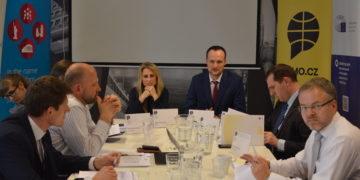Digital New Deal – What are the best ways forward for V4 countries with the ongoing digital revolution?

Digital New Deal was a year-long project implemented by Association for International Affairs (AMO) in cooperation with the Free Market Foundation (Hungary), Industrial Foundation (Poland) and F. A. Hayek Foundation (Slovakia). It was supported by the International Visegrad Fund and the Friedrich Naumann Foundation for Freedom. The main objective of the project was to start a broad expert discussion on what are the best ways forward for V4 countries with the ongoing digital revolution. For this purpose, the project provided publications gathering knowledge from the most relevant stakeholders in V4 region for the digital agenda and suggested policy recommendations reflecting regional specificities.
The project has been implemented in two phases during the 2018. The initial phase included drafting of research paper covering public discourses and existing strategies on Industry 4.0 and new technologies. The research paper was presented in Prague at roundtable chaired by MEP Dita Charanzová (ANO/ALDE) and was followed by discussion of representatives of state (a Deputy Minister in charge of Internetization or Chairman of the Board of the Czech Telecommunication Office), associations of employers, big companies (including Škoda Auto), academia and civil society.
The second phase of the project focused on analysis of strengths and weaknesses, identification of best practices and recommendations for the region on how to better implement new technologies. It also reflected role of the EU and prospects of the region and future cooperation with its main economic partner, Germany. The policy paper drafted in this second phase provides synthesis of perspectives of more than 60 stakeholders directly engaged by authors of the paper (either via common questionnaire or at roundtables chaired or attended by the authors), supplemented with opinions of additional 26 stakeholders adopted from media interviews.
According to the policy paper’s conclusion, the membership of the V4 countries in the EU and its internal market provides an important anchor for the whole region and allows transfer of technology and makes cross border expansion of start-ups much easier. The EU internal market is however not a complete project and it is in the interests of the V4 countries to push for its completion, including the Digital Single Market which remains highly fragmented despite good steps prepared recently by the European Commission. The EU was also by some respondents considered as an organization that already focuses on possible future threats, e.g. in the case of use of personal data. On the other hand, the solutions EU adopts may not always seem to fit the needs of the V4 region which then impedes its acceptance and practical implementation in the region (e. g. GDPR).
The overall lack of real political will to bring innovative changes to the domestic regulatory system (mentioned above) can also be seen in the inability to prevent the gold-plating of EU law that adds an unreasonable regulatory burden in competition with other EU countries and an insufficient ability to push at the EU level for suitable wording of exceptions that would fit into the needs of the V4 region. This relates to a lack of bottom-up initiative in the region. Early formulation of national positions is thus almost impossible. Consultations on positions in the V4 format may partly help it improve its chances to influence decision-making at the EU level.
The main goal of the project, enhancing debate about new technologies, was further served by a series of presentations of the paper by its authors at roundtable discussions in Prague, Bratislava and Budapest. In November 2018 the presentation took place also as a panel at the broadly attended Freedom Games in Łódź. Two more presentations took place in Berlin (organized together with the Freedom Neumann Foundation in Berlin) and in Brussels.



